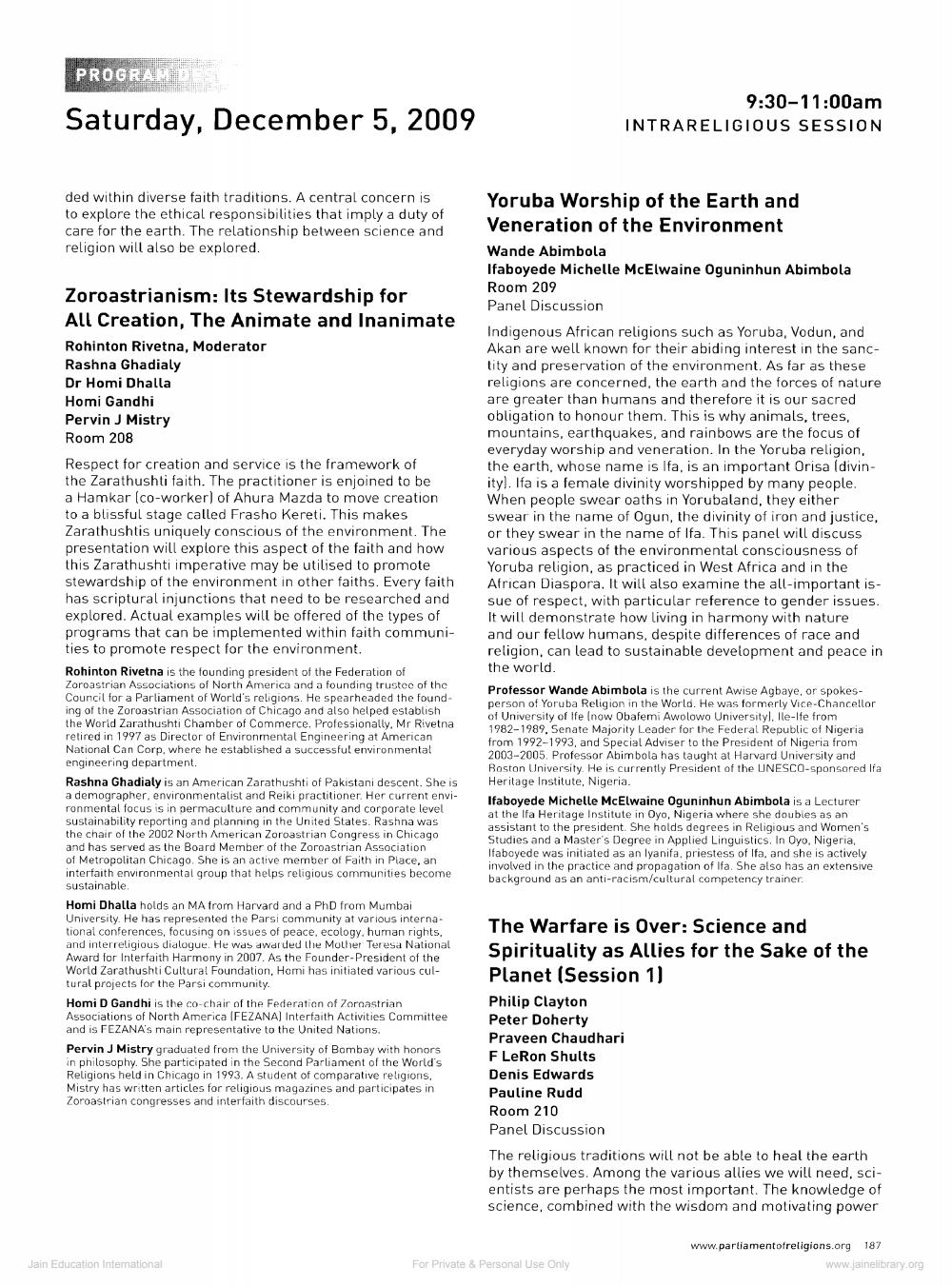________________
PROGRAM
Saturday, December 5, 2009
9:30-11:00am INTRARELIGIOUS SESSION
ded within diverse faith traditions. A central concern is to explore the ethical responsibilities that imply a duty of care for the earth. The relationship between science and religion will also be explored.
Zoroastrianism: Its Stewardship for All Creation, The Animate and Inanimate Rohinton Rivetna, Moderator Rashna Ghadialy Dr Homi Dhalla Homi Gandhi Pervin J Mistry Room 208 Respect for creation and service is the framework of the Zarathushti faith. The practitioner is enjoined to be a Hamkar (co-worker) of Ahura Mazda to move creation to a blissful stage called Frasho Kereti. This makes Zarathushtis uniquely conscious of the environment. The presentation will explore this aspect of the faith and how this Zarathushti imperative may be utilised to promote stewardship of the environment in other faiths. Every faith has scriptural injunctions that need to be researched and explored. Actual examples will be offered of the types of programs that can be implemented within faith communities to promote respect for the environment. Rohinton Rivetna is the founding president of the Federation of Zoroastrian Associations of North America and a founding trustee of the Council for a Parliament of World's religions. He spearheaded the found ing of the Zoroastrian Association of Chicago and also helped establish the World Zarathushti Chamber of Commerce. Professionally, Mr Rivetna retired in 1997 as Director of Environmental Engineering at American National Can Corp, where he established a successful environmental engineering department. Rashna Ghadialy is an American Zarathushti of Pakistani descent. She is a demographer, environmentalist and Reiki practitioner. Her current environmental focus is in permaculture and community and corporate level sustainability reporting and planning in the United States. Rashna was the chair of the 2002 North American Zoroastrian Congress in Chicago and has served as the Board Member of the Zoroastrian Association of Metropolitan Chicago. She is an active member of Faith in Place, an interfaith environmental group that helps religious communities become sustainable Homi Dhalla holds an MA from Harvard and a PhD from Mumbai University. He has represented the Parsi community at various international conferences, focusing on issues of peace, ecology, human rights, and interreligious dialogue. He was awarded the Mother Teresa National Award for Interfaith Harmony in 2007. As the Founder-President of the World Zarathushti Cultural Foundation, Homi has initiated various cultural projects for the Parsi community Homi D Gandhi is the co-chair of the Federation of Zoroastrian Associations of North America (FEZANA) Interfaith Activities Committee and is FEZANA's main representative to the United Nations. Pervin J Mistry graduated from the University of Bombay with honors in philosophy. She participated in the Second Parliament of the World's Religions held in Chicago in 1993. A student of comparative religions. Mistry has written articles for religious magazines and participates in Zoroastrian congresses and interfaith discourses
Yoruba Worship of the Earth and Veneration of the Environment Wande Abimbola Ifaboyede Michelle McElwaine Ogunin hun Abimbola Room 209 Panel Discussion Indigenous African religions such as Yoruba, Vodun, and Akan are well known for their abiding interest in the sanctity and preservation of the environment. As far as these religions are concerned, the earth and the forces of nature are greater than humans and therefore it is our sacred obligation to honour them. This is why animals, trees. mountains, earthquakes, and rainbows are the focus of everyday worship and veneration. In the Yoruba religion, the earth, whose name is Ifa, is an important Orisa (divinityl. Ifa is a female divinity worshipped by many people. When people swear oaths in Yorubaland, they either swear in the name of Ogun, the divinity of iron and justice, or they swear in the name of Ifa. This panel will discuss various aspects of the environmental consciousness of Yoruba religion, as practiced in West Africa and in the African Diaspora. It will also examine the all-important issue of respect, with particular reference to qender issues. It will demonstrate how living in harmony with nature and our fellow humans, despite differences of race and religion, can lead to sustainable development and peace in the world. Professor Wande Abimbola is the current Awise Agbaye, or spokesperson of Yoruba Religion in the World. He was formerly Vice-Chancellor of University of Ife Inow Obafemi Awolowo University. Ile-Ife from 1982-1989. Senate Majority Leader for the Federal Republic of Nigeria from 1992-1993, and Special Adviser to the President of Nigeria from 2003-2005. Professor Abimbola has taught at Harvard University and Boston University. He is currently President of the UNESCO-sponsored Ifa Heritage Institute, Nigeria. Ifaboyede Michelle McElwaine Oguninhun Abimbola is a Lecturer at the Ifa Heritage Institute in Oyo, Nigeria where she doubles as an assistant to the president. She holds degrees in Religious and Women's Studies and a Master's Degree in Applied Linguistics. In Oyo, Nigeria, Ifaboyede was initiated as an Iyanifa, priestess of Ifa, and she is actively involved in the practice and propagation of Ifa. She also has an extensive background as an anti-racism/cultural competency trainer.
The Warfare is Over: Science and Spirituality as Allies for the sake of the Planet (Session 1] Philip Clayton Peter Doherty Praveen Chaudhari F Leron Shults Denis Edwards Pauline Rudd Room 210 Panel Discussion The religious traditions will not be able to heal the earth by themselves. Among the various allies we will need, scientists are perhaps the most important. The knowledge of science, combined with the wisdom and motivating power
www.parliamento religions.org 187
www.jainelibrary.org
Jain Education International
For Private & Personal Use Only




